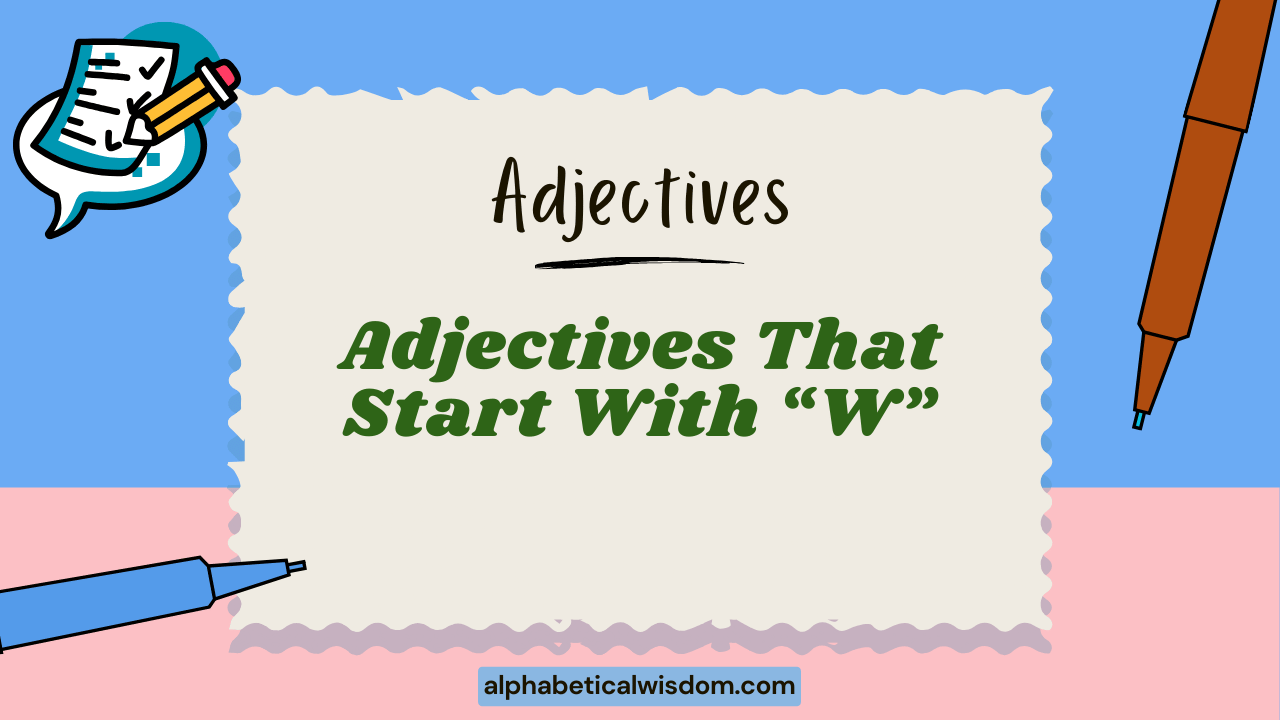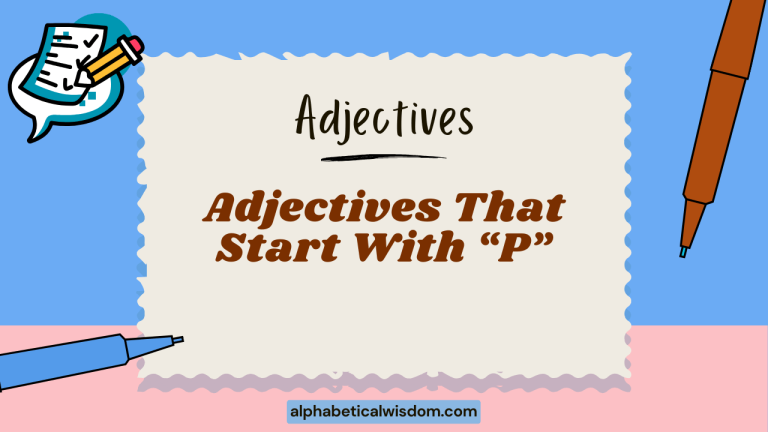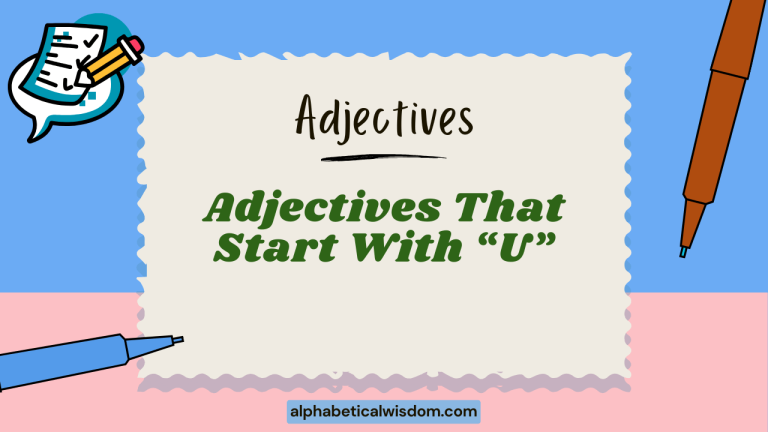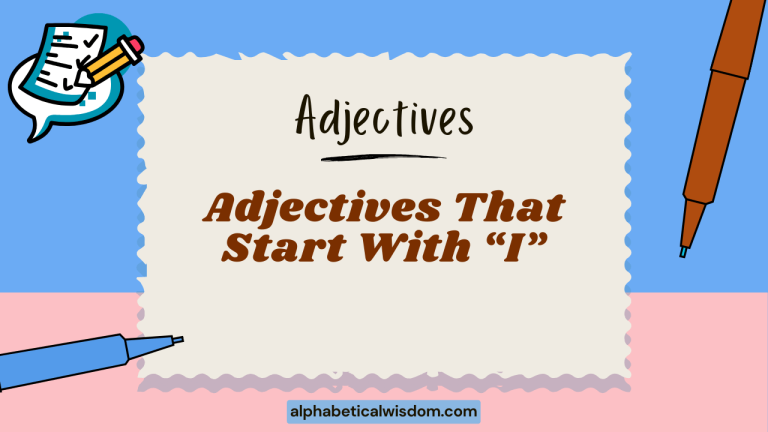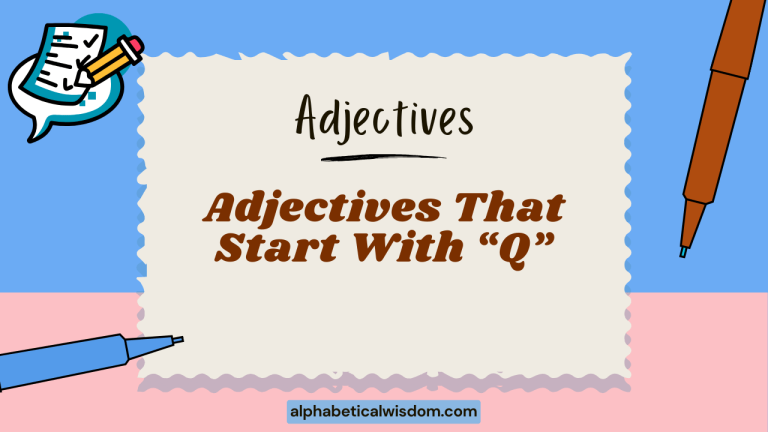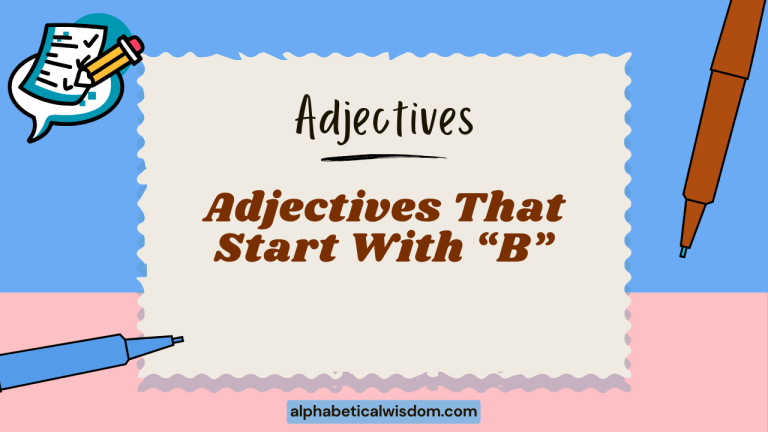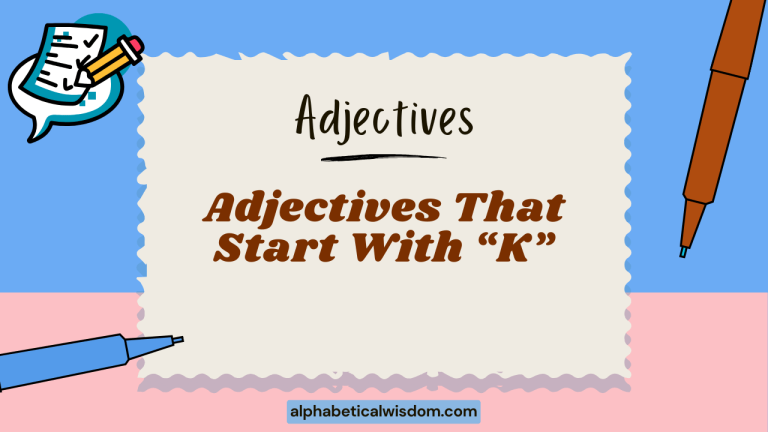Adjectives That Start With W: Grammar Guide & Examples
Adjectives are essential components of the English language, enriching our descriptions and providing vivid details. Focusing on adjectives that start with “W” can expand your vocabulary and enhance your writing and speaking skills.
This article provides a comprehensive guide to these adjectives, offering definitions, examples, and practical exercises to help you master their usage. Whether you’re a student, a writer, or simply an English language enthusiast, this article will equip you with the knowledge and tools to confidently use “W” adjectives.
Table of Contents
- Introduction
- Definition of Adjectives
- Function of Adjectives
- Structural Breakdown
- Types of “W” Adjectives
- Examples of “W” Adjectives
- Usage Rules
- Common Mistakes
- Practice Exercises
- Advanced Topics
- FAQ
- Conclusion
Definition of Adjectives
An adjective is a word that modifies a noun or pronoun. It provides additional information about the noun, such as its qualities, characteristics, or attributes.
Adjectives answer questions like “What kind?”, “Which one?”, “How many?”, or “How much?” They play a crucial role in making our language more descriptive and engaging.
Adjectives can be classified based on their function and the type of information they convey. Understanding these classifications can help you use adjectives more effectively and accurately.
They enhance clarity and precision in both written and spoken communication.
Function of Adjectives
The primary function of an adjective is to describe or modify nouns and pronouns. They add detail and specificity, allowing us to create richer and more vivid descriptions.
Adjectives can also express opinions, judgments, or subjective evaluations.
Adjectives can appear in two main positions within a sentence: attributive and predicative. An attributive adjective comes before the noun it modifies (e.g., “the warm sun”). A predicative adjective follows a linking verb and describes the subject (e.g., “the sun is warm”).
Structural Breakdown
Adjectives typically precede the noun they modify in English. However, they can also follow linking verbs such as be, seem, appear, become, and feel. The position of the adjective can sometimes affect the emphasis or nuance of the sentence.
Adjectives can be modified by adverbs, which further enhance their meaning. For example, in the phrase “very warm,” the adverb “very” intensifies the adjective “warm.” This allows for more precise and nuanced descriptions.
Types of “W” Adjectives
Adjectives starting with “W” can be categorized based on their meaning and function. Here are some common types:
Descriptive Adjectives
These adjectives describe the qualities or characteristics of a noun. They provide details about appearance, texture, color, or other attributes. Examples include “warm,” “wide,” “wooden,” and “wonderful.”
Quantitative Adjectives
These adjectives indicate the quantity or amount of a noun. They answer the question “How many?” or “How much?” Examples include “whole” (referring to an entire amount) and sometimes adjectives like “wide” can imply a large quantity or extent.
Demonstrative Adjectives
While less common with “W,” some adjectives derived from words starting with “W” can function demonstratively, indicating which specific noun is being referred to. For instance, using “western” to specify a particular region.
Examples of “W” Adjectives
Here are several examples of adjectives that start with “W,” categorized by their connotation:
Positive Connotations
These adjectives convey positive feelings or attributes. They are often used to describe things that are pleasant, desirable, or beneficial.
The following table provides examples of adjectives with positive connotations, along with example sentences demonstrating their usage.
| Adjective | Example Sentence |
|---|---|
| Warm | The warm sun felt good on my skin. |
| Welcome | A welcome breeze cooled the hot afternoon. |
| Whole | She ate the whole apple in one sitting. |
| Wholesome | The wholesome meal nourished our bodies. |
| Wonderful | We had a wonderful time at the party. |
| Winning | The team celebrated their winning streak. |
| Wise | The wise old owl offered sage advice. |
| Witty | His witty remarks always made us laugh. |
| Worthy | She is a worthy candidate for the job. |
| Wondrous | We marveled at the wondrous sight of the aurora borealis. |
| Well-behaved | The well-behaved children impressed their teachers. |
| Well-groomed | He looked well-groomed for the important meeting. |
| Well-known | She is a well-known author in the literary world. |
| Well-read | He is a well-read individual with a vast knowledge of history. |
| Well-rounded | A well-rounded education is essential for personal growth. |
| Wealthy | The wealthy philanthropist donated generously to charity. |
| Weightless | The astronaut felt weightless in the space station. |
| Welcome | A welcome surprise awaited us at the door. |
| Westward | The pioneers traveled westward in search of new opportunities. |
| Wild | The wild flowers added beauty to the meadow. |
| Willing | He was willing to help with the project. |
| Windy | The windy day was perfect for flying kites. |
| Winning | She had a winning smile that charmed everyone. |
| Wintery | The wintery landscape was covered in snow. |
| Womanly | She possessed a womanly grace and elegance. |
| Woodsy | The woodsy scent of pine filled the air. |
| Workable | The plan seemed workable after some adjustments. |
| Worldly | He had a worldly perspective after traveling extensively. |
| Worthwhile | Volunteering at the shelter was a worthwhile experience. |
Negative Connotations
These adjectives convey negative feelings or attributes. They are often used to describe things that are unpleasant, undesirable, or harmful.
The following table provides examples of adjectives with negative connotations, along with example sentences demonstrating their usage.
| Adjective | Example Sentence |
|---|---|
| Wasteful | It’s wasteful to throw away perfectly good food. |
| Weak | The weak bridge collapsed under the weight. |
| Weary | The weary traveler needed a place to rest. |
| Weird | He had a weird feeling about the situation. |
| Wicked | The wicked witch cast a spell on the prince. |
| Woeful | The team’s performance was woeful. |
| Worthless | The old coin turned out to be worthless. |
| Wrong | He gave the wrong answer to the question. |
| Wretched | The wretched conditions in the prison were appalling. |
| Wary | She was wary of strangers approaching her in the dark. |
| Waterlogged | The waterlogged field was impossible to play on. |
| Wayward | The wayward child often disobeyed his parents. |
| Weak-willed | He was too weak-willed to resist temptation. |
| Wearisome | The wearisome journey seemed never-ending. |
| Weeping | The weeping willow tree drooped sadly. |
| Weighty | The Weighty problem burdened his mind. |
| Wheezing | The wheezing old engine struggled to start. |
| Whimsical | His whimsical behavior often annoyed others. |
| Whiny | The whiny child constantly complained. |
| Withdrawn | She became withdrawn after the traumatic event. |
| Woebegone | The woebegone expression on his face revealed his sadness. |
| Wooden | His wooden acting lacked emotion. |
| Wordy | The wordy report was difficult to understand. |
| Worried | She was worried about the upcoming exam. |
| Worthless | He felt worthless after losing his job. |
| Wrathful | The wrathful king punished his enemies severely. |
| Wretched | The wretched beggar pleaded for food. |
| Wrongful | He was wrongly accused of the crime. |
| Wry | He had a wry sense of humor. |
Neutral Connotations
These adjectives don’t necessarily convey positive or negative feelings. They simply describe a characteristic or attribute without expressing judgment.
The following table provides examples of adjectives with neutral connotations, along with example sentences demonstrating their usage.
| Adjective | Example Sentence |
|---|---|
| Woven | The woven basket held the fruit. |
| Wide | The wide river flowed through the valley. |
| Wooden | The wooden table was sturdy and old. |
| Woolen | She wore a woolen scarf to keep warm. |
| Working | The working class struggled to make ends meet. |
| Written | The written agreement outlined the terms. |
| White | The white snow covered the ground. |
| Whole | The whole pie was gone in minutes. |
| Weekly | The weekly meeting was held every Monday. |
| Western | The western part of the country is known for its deserts. |
| Wet | The wet pavement glistened in the rain. |
| Whispering | The whispering wind rustled the leaves. |
| Wide-ranging | The discussion covered a wide-ranging set of topics. |
| Wild | The wild animals roamed freely in the jungle. |
| Wireless | The wireless internet connection was fast and reliable. |
| Wiring | The wiring in the old house needed to be replaced. |
| Withering | The withering flowers needed water. |
| Wooden | The wooden fence surrounded the garden. |
| Wordless | They shared a wordless understanding. |
| Worldwide | The company has a worldwide presence. |
| Worn | The worn leather jacket was a treasured possession. |
| Worthy | The cause was worthy of their support. |
| Wrinkled | The wrinkled old man smiled kindly. |
| Written | The written instructions were clear and concise. |
| Wrongful | The wrongful conviction was later overturned. |
| Wry | He gave a wry smile, indicating his skepticism. |
| Weekly | The weekly newsletter is distributed every Friday. |
| Wholesale | The company sells its products on a wholesale basis. |
| Windproof | The windproof jacket protected him from the harsh weather. |
Usage Rules
When using adjectives, it’s important to follow certain rules to ensure clarity and correctness. Adjectives typically precede the noun they modify, but they can also follow linking verbs.
Understanding the order of adjectives and avoiding misplaced modifiers are key to effective communication.
Order of Adjectives: When using multiple adjectives, there’s a general order to follow: opinion, size, age, shape, color, origin, material, and purpose. For example, “a beautiful large old round blue French cotton serving bowl.”
Coordinate Adjectives: Coordinate adjectives are adjectives that modify the same noun equally and can be separated by a comma or the word “and.” For example, “a warm, sunny day” or “a warm and sunny day.”
Common Mistakes
One common mistake is using adjectives incorrectly as adverbs or vice versa. Remember that adjectives modify nouns, while adverbs modify verbs, adjectives, or other adverbs.
Another common error is misplacing adjectives, which can lead to confusion about what is being modified.
Incorrect: He ran quick. (Quick is an adjective; the correct word is quickly, an adverb.)
Correct: He ran quickly.
Incorrect: The man was walking a dog with a red collar. (This implies the man has a red collar.)
Correct: The man was walking a dog that had a red collar.
Practice Exercises
Test your understanding of adjectives that start with “W” with these exercises:
Exercise 1: Fill in the Blanks
Fill in the blanks with an appropriate adjective that starts with “W.”
| Question | Answer |
|---|---|
| 1. The _________ fire kept us warm on the cold night. | 1. warm |
| 2. She received a _________ reception from her colleagues. | 2. welcome |
| 3. The _________ family donated generously to the local charity. | 3. wealthy |
| 4. The _________ journey left them exhausted. | 4. wearisome |
| 5. The _________ child was often in trouble. | 5. wayward |
| 6. He gave a _________ smile, hinting at his amusement. | 6. wry |
| 7. The _________ old house creaked in the wind. | 7. wooden |
| 8. She wore a _________ scarf to keep warm. | 8. woolen |
| 9. The _________ agreement clearly stated the terms. | 9. written |
| 10. He is a _________ man, known for his kindness. | 10. worthy |
Exercise 2: Sentence Construction
Create sentences using the following adjectives that start with “W.”
- Wonderful
- Wasteful
- Wide
- Wise
- Weary
Answers:
- We had a wonderful vacation in Hawaii.
- It is wasteful to leave the lights on when you are not in the room.
- The wide river was perfect for boating.
- The wise old man gave insightful advice.
- The weary travelers rested under the shade of the tree.
Exercise 3: Error Correction
Identify and correct the errors in the following sentences.
| Question | Answer |
|---|---|
| 1. The weather was warmful. | 1. The weather was warm. |
| 2. She is a worthy woman. | 2. She is a worthy woman. (No error) |
| 3. He ran wasteful. | 3. He was wasteful. |
| 4. The house was woodenly. | 4. The house was wooden. |
| 5. It was a welcomeful surprise. | 5. It was a welcome surprise. |
Advanced Topics
For advanced learners, exploring the nuances of adjective usage can further enhance their language skills. This includes understanding compound adjectives, participial adjectives, and the use of adjectives in figurative language such as metaphors and similes.
Compound Adjectives: These are adjectives made up of two or more words, often hyphenated. For example, “well-known” or “long-term.”
Participial Adjectives: These are adjectives formed from verbs, either present participles (ending in -ing) or past participles (often ending in -ed or -en). For example, “working” (present participle) or “written” (past participle).
FAQ
- What is the difference between an adjective and an adverb?
Adjectives modify nouns or pronouns, while adverbs modify verbs, adjectives, or other adverbs. Adjectives describe qualities or characteristics, while adverbs describe how, when, where, or to what extent an action is performed. - Can an adjective modify another adjective?
No, adjectives cannot directly modify other adjectives. Instead, adverbs are used to modify adjectives, providing more detail about the degree or intensity of the adjective. For example, “very warm” uses the adverb “very” to modify the adjective “warm.” - What is a linking verb, and how does it relate to adjectives?
A linking verb connects the subject of a sentence to a word or phrase that describes or identifies the subject. Common linking verbs include be, seem, appear, become, and feel. Adjectives that follow linking verbs are called predicative adjectives and describe the subject of the sentence. - How do I determine the correct order of adjectives in a sentence?
The general order of adjectives is: opinion, size, age, shape, color, origin, material, and purpose. While this is a guideline, native speakers often use intuition and context to determine the most natural-sounding order. - What are coordinate adjectives, and how are they punctuated?
Coordinate adjectives are adjectives that modify the same noun equally and can be separated by a comma or the word “and.” For example, “a warm, sunny day” or “a warm and sunny day.” If the adjectives are not coordinate, they should not be separated by a comma. - Can a noun be used as an adjective?
Yes, a noun can be used as an adjective to modify another noun. This is called a noun adjunct or attributive noun. For example, in the phrase “computer screen,” the noun “computer” is used as an adjective to describe the type of screen. - What is a participial adjective?
A participial adjective is an adjective formed from a verb, either a present participle (ending in -ing) or a past participle (often ending in -ed or -en). For example, “working” (present participle) in “working woman” or “written” (past participle) in “written agreement.” - How can I improve my use of adjectives in writing?
To improve your use of adjectives, focus on expanding your vocabulary, paying attention to the specific qualities you want to describe, and practicing using adjectives in different contexts. Reading widely and analyzing how other writers use adjectives can also be helpful. - Are there any adjectives that start with “W” that have both positive and negative connotations?
Yes, some adjectives can have both positive and negative connotations depending on the context. For example, “wild” can describe something exciting and free (positive) or something uncontrolled and dangerous (negative). - What is the difference between “whole” and “wholesome”?
“Whole” refers to the entire amount or completeness of something (e.g., “the whole pie”). “Wholesome” refers to something that is good for your health or well-being (e.g., “wholesome food”).
Conclusion
Mastering adjectives that start with “W” can significantly enhance your English language skills. By understanding their definitions, functions, and usage rules, you can create more vivid and descriptive sentences.
Remember to practice using these adjectives in various contexts to solidify your understanding.
Continue to expand your vocabulary and pay attention to how adjectives are used in both written and spoken English. With consistent effort, you can confidently and effectively use adjectives that start with “W” to enrich your communication.
